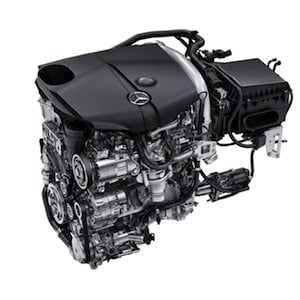We are often asked how a diesel engine works and what makes it different to a petrol engine. As a fuel substance, diesel is denser, slower to evaporate and easier to refine than petrol. These qualities make it cheaper, and more efficient in terms of mileage, than petrol. While petrol and diesel engines work in mostly the same way, the methods behind them differ.
Like a petrol engine, a diesel engine uses a four-stroke combustion cycle. Air is let into the cylinder as the piston moves down (first stroke), and is then compressed as the piston moves back up again (second stroke). As the piston reaches the top of the cylinder, diesel fuel is injected and ignites, with the resulting explosion forcing the piston back down (third stroke). The final stroke is as the piston moves back up again, forcing the exhaust products out of the exhaust valve (fourth stroke).
The benefits of a diesel engine
 Diesel is a less volatile fuel than petrol, so in order to ignite more easily, the combustion chamber needs to be preheated. This is done by injecting air into the cylinder. The air is drawn in and passed through a cleaner, which is about the same size as would be found on a petrol engine. The air is then compressed by the piston, which heats the air to a very high degree so that when the diesel is injected, the fuel ignites instantaneously. This is why a diesel engine is often described as a compression-ignition engine. In a petrol engine, fuel and air are mixed together first, and then ignited by a spark plug. A diesel engine does not require a spark plug.
Diesel is a less volatile fuel than petrol, so in order to ignite more easily, the combustion chamber needs to be preheated. This is done by injecting air into the cylinder. The air is drawn in and passed through a cleaner, which is about the same size as would be found on a petrol engine. The air is then compressed by the piston, which heats the air to a very high degree so that when the diesel is injected, the fuel ignites instantaneously. This is why a diesel engine is often described as a compression-ignition engine. In a petrol engine, fuel and air are mixed together first, and then ignited by a spark plug. A diesel engine does not require a spark plug.
Installing a turbocharger allows more air to be drawn into the engine, which can have the effect of increasing the power of diesel fuel by half again, whilst lowering fuel consumption by up to a quarter.
The difference with diesel engines
Many diesel engines still have glow plugs, which act to heat the cylinder, and are generally needed for starting in cold temperatures. Before the fuel can be injected into the cylinder, it has to be filtered and compressed. Filtering is important, as contaminants in the fuel can clog the holes in the injector nozzles.
Next the fuel passes through the fuel injection pump, which pressurises it to around 24,000 psi (pounds per square inch). By comparison, in a petrol engine the fuel is usually kept at a pressure of between just 10 to 50psi.
Diesel advances
Diesel engines were once considered to be dirty and primarily for agricultural purposes. However, engine manufacturers have made significant improvements in the way diesel engines work, making them much cleaner, quieter and more efficient. Diesel cars now account for over half of all new car sales in the UK.
While not necessarily ideal for regular low-mileage trips, a diesel engine’s superior fuel economy usually makes it a good choice for drivers who need to travel long distances.

No comments:
Post a Comment